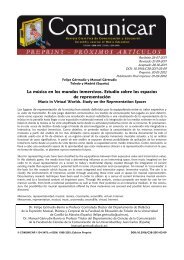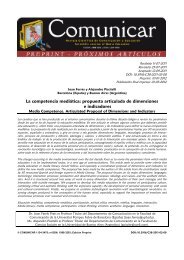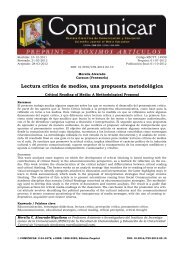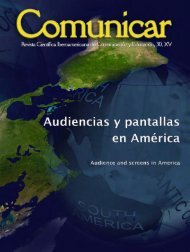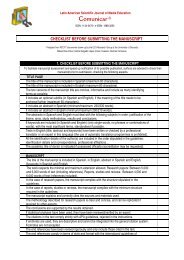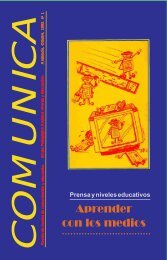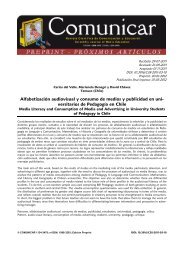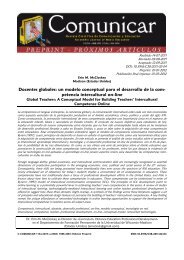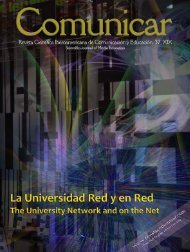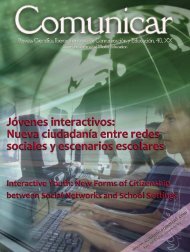Comunicar 39-ingles - Revista Comunicar
Comunicar 39-ingles - Revista Comunicar
Comunicar 39-ingles - Revista Comunicar
Create successful ePaper yourself
Turn your PDF publications into a flip-book with our unique Google optimized e-Paper software.
INVESTIGACIONES / RESEARCHl Rosario Del Rey, José A. Casas & Rosario OrtegaSevilla / Córdoba (Spain)Received: 24-01-2012 / Reviewed: 12-03-2012Accepted: 03-04-2012 / Published: 01-10-2012DOI: 10.<strong>39</strong>16/C<strong>39</strong>-2012-03-03The ConRed Program, an EvidencebasedPracticeEl programa ConRed, una práctica basada en la evidenciaABSTRACTThe incredible force with which ITCs have arrived in society and the consequent risks to children when dealingwith the Internet and social networks make it necessary for the domain of virtual environments to be included in theschool curriculum. However, the initiatives in this direction are limited and there is a lack of rigorously evaluatedprograms that might act as a basis for designing educational lines of action. The ConRed Program is based on thetheory of normative social behavior and aims to reduce problems such as cyber-bullying and addiction to the Internetand refocus the misadjusted perception of information control in the social networks in order to promote their usein a more beneficial way. The ConRed Program has been evaluated using a quasi-experimental methodology, withan experimental group (N=595) and a quasi-control group (N=298) consisting of 893 students (45.9% girls) withan average age of 13.80 years (SD= 1.47). The reduction of problems in the experimental group and the lack ofchange in the control group is evidence of the program’s validity, and show that by working and collaborating withthe whole educational community it is possible to improve the quality of the virtual and, therefore, the real life ofadolescents.RESUMENLa vertiginosa incorporación de las TIC a la sociedad y los consecuentes riesgos a los que los menores se enfrentanen Internet y las redes sociales han dejado en evidencia la necesidad de incorporar en el currículum escolar el dominiode los entornos virtuales. En cambio, son escasas las iniciativas en esta dirección y más aún programas rigurosamenteevaluados, de modo que sirvan de fundamento para el diseño de las líneas de acción educativa. El programaConRed está basado en la teoría del comportamiento social normativo y persigue los objetivos de mejorar y reducirproblemas como el cyberbullying, la dependencia a Internet y la desajustada percepción del control de la informaciónen las redes sociales, para así potenciar el uso beneficioso de éstas. La evaluación del ConRed se ha desarrolladomediante una metodología cuasi experimental, con un grupo experimental (N=595) y uno cuasi-control(N=298). Del total de los 893 estudiantes, el 45,9% eran chicas y la edad media 13,80 años (DT=1,47). Los resultadospositivos de reducción de problemas en el grupo experimental y la ausencia de cambio en el grupo control sonmuestra de su validez y demuestran que trabajando con toda la comunidad educativa y en colaboración con ella esposible mejorar la calidad de la vida virtual y, por tanto, real de los adolescentes.KEYWORDS / PALABRAS CLAVECyberbullying, addiction, privacy, psycho-educational intervention, evaluation, social networks, Internet.Ciberbullying, adicción, privacidad, intervención psicoeducativa, evaluación, redes sociales, Internet.v Dr. Rosario Del-Rey is Assistant Lecturer in the Department of Evolutive Psychology of the Faculty ofEducational Sciences at the University of Sevilla (Spain) (delrey@us.es).v José Antonio Casas is Assistant Researcher in the Department of Psychology of the Faculty of EducationalSciences at the University of Cordoba (Spain) (m22caboj@uco.es).v Dr. Rosario Ortega is Full Professor and Director in the Department of Psychology of the Facultyof Educational Sciences at the University of Cordoba (Spain) (ed1orrur@uco.es).<strong>Comunicar</strong>, n. <strong>39</strong>, v. XX, 2012, Scientific Journal of Media Education; ISSN: 1134-3478; pages 129-137www.comunicarjournal.com



